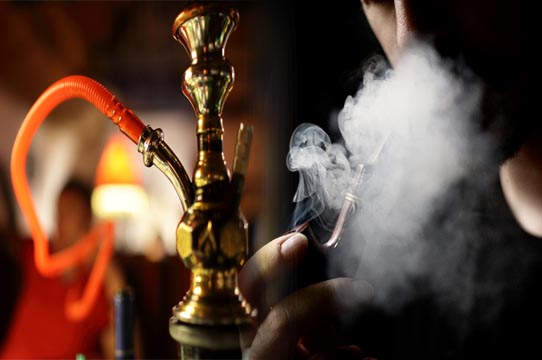
Vision for Alternative Development (VALD Ghana) has called for a ban on shisha in Ghana.
This is after it said it sighted a video in which some students from the Sunyani Senior High School were seen smoking shisha.
In a statement, the group said it was time “to take giant steps which go beyond education and sensitization.”
“We therefore call on the Ministry of Health and the FDA to as a matter of urgency begin the process of outlawing the products in Ghana. Many countries including, Rwanda, Uganda, Kenya, Tanzania, Cameroon etc. have taken bold steps in banning shisha in their countries, because of the public health threat it will have on their children and their youth.”
The group also called for improved education on the effects of tobacco in education institutions.
“Also, there must be a deliberate plan to roll out education in our schools, especially the second cycle and tertiary institutions on the negative effects of tobacco use on their health,” it added.
On sanctions at the Sunyani school, the group said it was “even more disturbed about the action taken by the authorities of the school to suspend these girls.”
“The school authorities and the Ghana Education Service must be more concerned about the effects the product has had on these young girls and provide them some medical and counselling attention.”
Find below the full statement
Shisha is a threat to Ghanaian youth; regulating it is not enough – An outright ban is urgently required
The attention of Vision for Alternative Development (VALD Ghana), Ghana NCD Alliance and other CSO Actors have been drawn to a viral video in which some students from the Sunyani Senior High School were seen smoking shisha, one of the tobacco industry’s deadliest products.
As civil society actors working in the tobacco control and the NCD space, we are concerned about the dangers this act will have on the health of these young girls involved.
We are even more disturbed about the action taken by the authorities of the School to suspend these girls. The school authorities and the Ghana Education Service must be more concerned about the effects the product has had on these young girls and provide them some medical and counselling attention.
There is the need for intensive investigation by the Food and Drugs Authority to attain further information about the facility, where the shisha is being offered, and whether it meets the regulatory standards. This is a clear violation of the Tobacco Control Measures of the Ghana Public Health Act (Act 851) of 2012, which seeks to protect children from the use and exposure to tobacco smoke.
CSO actors in health, led by VALD-Ghana have in the past called on the FDA and MoH to use either an administrative fiat or guidelines to ban this deadly product in Ghana, but no action was taken. Shisha over the years has become a fashionable product among the second cycle institutions and at the Tertiary levels and is more common in many communities of Ghana. It is therefore important to note that regulating shisha by the FDA given the recent increase in consumption, especially among the youth is certainly not deterrent enough, putting the future of our children at risk.
Additionally, considering the health implications of smoking shisha as research reveals that, a session of shisha is equivalent to smoking over 100 sticks of cigarettes, thus it has become more expedient to ban it rather than regulating it. Many of the shisha products are also illegally sold as they do not meet the required standards.
Research by the Ghana Health Service indicates that most of the country’s youth have ditched the smoking of traditional tobacco cigarettes for e-cigarettes and shisha. Revealing that the rate of smoking shisha and e-cigarettes among young people has shot up to 5.3 percent, higher than the traditional use of tobacco which stands at 2.8 percent.
Despite the ban on tobacco-related advertisements and the law against smoking in public places, the consumption of tobacco and its related products is still on the rise in Ghana. A study on “The Economics of Tobacco Control/Taxation in Ghana” facilitated by VALD Ghana revealed that, the youth and women especially are now getting hooked on to flavoured tobacco/cigarettes and shisha because of its appealing fragrance.
There is a misconception held by many people that shisha is safer than cigarettes because of its contact with water, however, according to the American Lung Association, at least 82 toxic chemicals and carcinogens have been identified in hookah/shisha smoke. Additionally, although the smoke passes through water, this does not eliminate the hazardous, addictive chemicals released from tobacco.
Smoking shisha increases the risk of oral cancer, lung cancer, heart diseases, among others; moreover, the body fluids exchanged with multiple people sharing one pipe which are not cleaned properly or at all present another avenue for the spread of infectious diseases.
The tobacco industry knows that an overwhelming majority of smokers first begin to smoke while still in their teens as they are highly vulnerable to the effects of the powerful addictive nicotine, hence their intentional and deliberate trend of strategically recruiting “replacement smokers” so as to continuously stay in business.
VALD Ghana and its partners acknowledge the efforts of the Food and Drugs Authority in promoting education and awareness creation on the harmful effects of tobacco use; however, we believe it is time we take giant steps which goes beyond education and sensitization.
We therefore call on the Ministry of Health and the FDA to, as a matter of urgency, begin the process of outlawing the products in Ghana. Many countries including, Rwanda, Uganda, Kenya, Tanzania, Cameroon etc. have taken bold steps in banning shisha in their countries, because of the public health threat it will have on their children and their youth.
Also, there must be a deliberate plan to roll out education in our schools, especially the second cycle and tertiary institutions, on the negative effects of tobacco use on their health.
Posted by: Emmanuel Romeo Tetteh




